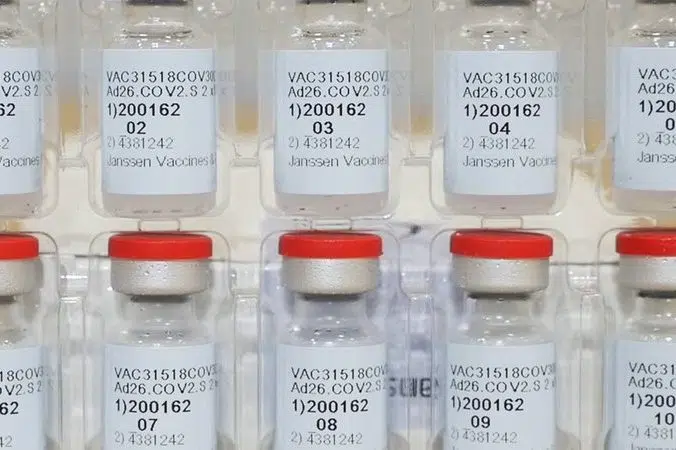OTTAWA — Health Canada has approved the COVID-19 vaccine from Johnson & Johnson, saying it has the evidence showing the vaccine is both safe and effective against the novel coronavirus that causes the disease.
Prime Minister Justin Trudeau also said Friday that Canada will get an extra 1.5 million doses of Pfizer-BioNTech’s COVID-19 vaccine delivered this month.
Another one million doses will arrive in both April and May. Those doses were originally set to arrive in the summer.
After the first doses of Pfizer-BioNTech’s vaccine arrived before the end of 2020, the national vaccination effort slowed sharply in January while Pfizer upgraded production lines at a major factory in Belgium.
The Johnson & Johnson vaccine is the fourth distinct COVID-19 shot approved for use in Canada and the first and only one Canada has purchased that requires just a single dose.
Canada has pre-purchased 10 million doses of the Johnson & Johnson vaccine, developed by subsidiary Janssen Pharmaceuticals. Canada has options to buy another 28 million doses.
The vaccine can be stored and transported at refrigerated temperatures for at least three months, facilitating distribution across the country, Health Canada noted in a statement Friday morning.
It has been approved for use in adults over the age of 18 and clinical trials are underway to see if it will be safe for children, Dr. Supriya Sharma, the chief medical adviser at Health Canada, said Friday.
“This will be important research to support vaccine availability for Canadians of all ages,” she said.
In clinical trials, the vaccine was shown to be 66 per cent effective overall in preventing moderate to severe COVID-19, and was also shown to provide protection against some of the variants of the virus currently in circulation.
Health Canada has now approved four distinct COVID-19 vaccines, with the others being from Pfizer-BioNTech, Moderna and Oxford-AstaZeneca. The regulator includes a fifth on its list of authorized shots: Covishield, which is a separate brand name for doses of the Oxford-AstraZeneca vaccine produced at the Serum Institute of India.
Apart from the Johnson & Johnson vaccine, they all require two shots spaced weeks or months apart.
They all have varying levels of efficacy, and are being allocated in part based on what ages they are approved for and their differing shipping and storage requirements.
The National Advisory Committee on Immunization is in charge of helping shape the guidelines around who gets what and when, taking into account not just scientific information but demographic factors, supply and capacity for the provinces to deliver.
Sharma stressed no matter which vaccines Canadians get, it will help protect them from getting COVID-19, as well as becoming seriously ill.
“What’s really important is whether any of the vaccines will prevent you from being hospitalized, or dying of COVID-19. We know that all of the vaccines will protect you.”
Joelle Paquette, the director general for vaccines at Public Services and Procurement Canada, says the 10 million doses are to arrive by September.
It’s not expected any will flow to Canada until at least April.
“At the moment, we are still in discussion with Johnson & Johnson to determine where their doses will be coming from and the delivery schedule,” Paquette said Thursday.
Delivery schedules are not confirmed publicly until Health Canada’s regulatory review team gives a vaccine its seal of approval.
Bahrain was the first jurisdiction to approve J&J’s vaccine on Feb. 25, followed by the U.S. two days later.
Production problems slowed initial deliveries in the United States. The Americans were to get 10 million doses as soon as the vaccine was approved but there were only four million doses shipped out March 1.
The U.S. expects to get another 16 million doses by the end of March and 100 million total by the end of June.
There remains only one more vaccine currently under review by Health Canada, called Novavax, and Sharma said a decision on whether it can be used in Canada is weeks or maybe even months away.
The Canadian Press
Note to readers: This is a corrected story. A previous version said the U.S. was the first country to approve the Johnson & Johnson vaccine on Feb. 26.







